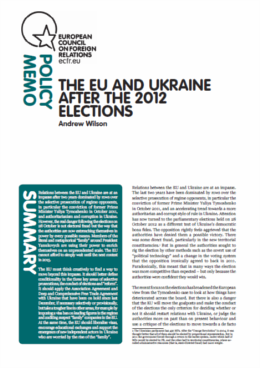The EU and Ukraine after the 2012 elections
The EU needs to rethink its approach towards Ukraine
Europe needs to realise that the political situation in Ukraine is deteriorating. Ukraine has become more authoritarian and corrupt – it is therefore essential for the EU to change its approach and abandon its “business as usual” attitude.
The parliamentary elections in Ukraine were a powerful reminder that democratic principles have been replaced by “political technology” and that the influence of oligarchs has reached new levels. Members of the literal and metaphorical “family” around President Yanukovych are using their power to enrich themselves on an unprecedented scale.
In a new ECFR policy memo,”The EU and Ukraine after the 2012 elections“, Andrew Wilson argues that ignoring the problems in Ukraine would simply allow these worrisome trends to get worse.
What the EU should do:
- Smart conditionality: The EU needs to redefine conditionality in three key areas: selective prosecutions, the conduct of elections and sustainable reform.
- Rethink EU-Ukraine trade deals: DCFTA and AA ratification need to be linked to real progress in Ukraine and alternatives to a full implementation should be developed.
- Fight against corruption:The EU should start auditing the activities of corrupt “family” companies in Cyprus, Luxembourg and Austria which are breaking existing EU law.
- Visa bans: The EU should develop a Ukrainian equivalent of the “Magnitsky List” starting with a visa ban on Renat Kuzmin, the deputy prosecutor responsible for the trials of Tymoshenko and former Interior Minister Yuriy Lutsenko.
- Support for SMEs: The EU should help revive lending schemes for SMEs and support businesses that are worried by the rise of corrupt oligarchs.
The European Council on Foreign Relations does not take collective positions. ECFR publications only represent the views of their individual authors.



